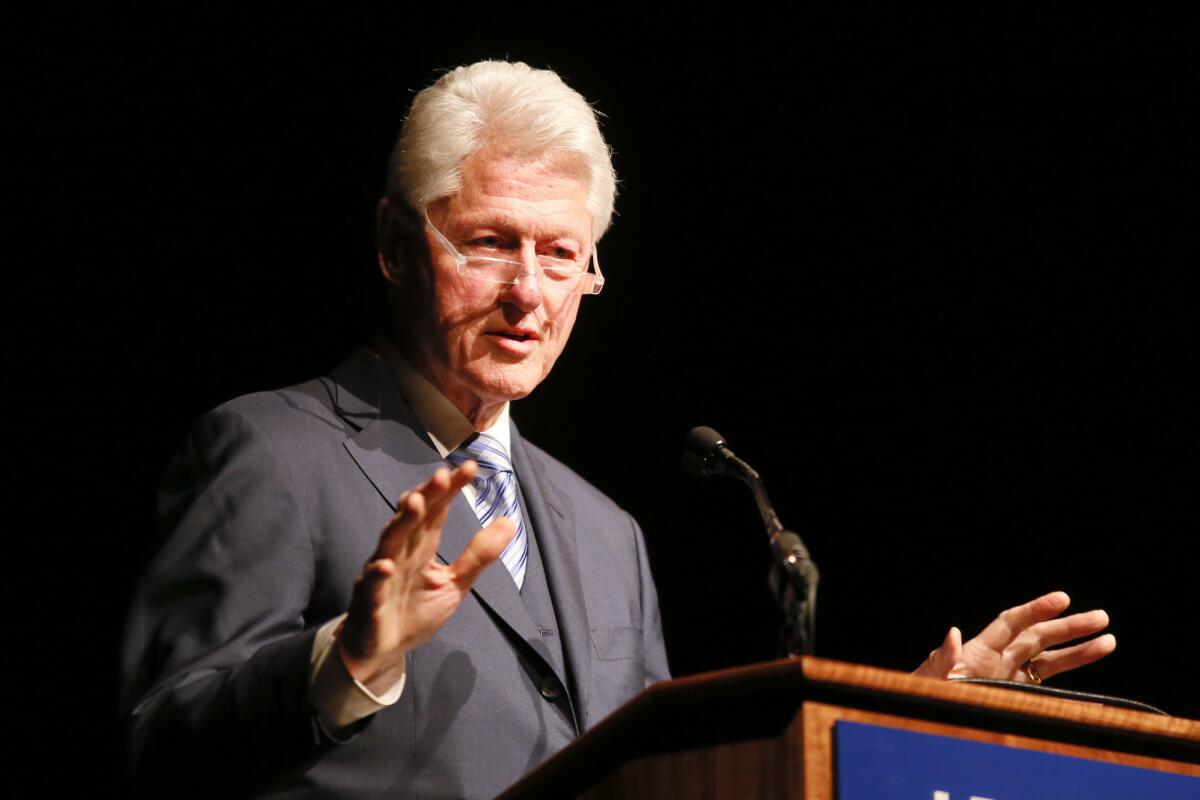Judges dismantle voter ID laws while voting rights ‘advocates’ dither

- Share via
The saddest spectacle on the voting rights front lately has been the sight of progressive voting rights “reformers” giving up the fight against photo ID laws.
In the front ranks of these sunshine patriots (to cadge a phrase from Thomas Paine) have been former United Nations Ambassador Andrew Young and former President Bill Clinton, who recently came out in favor of forcing the Social Security Administration to issue photo IDs to citizens who request them.
The argument is that Republican-sponsored voter ID laws are here to stay, so we might as well just make it easier for people to get photo IDs so they can exercise their right to vote. (The argument is also advanced by political scientist Norman Ornstein, co-founder of a voting rights group called WhyTuesday, which is chaired by Young.)
We’ve described the numerous drawbacks of this sort of capitulation here and here. We called the Social Security photo ID thing “a terrible idea,” which got Young’s troupe of loyal supporters all upset.
Now it turns out that photo ID laws may not, indeed, be here to stay. Over the last week, judges in three states have tossed them out, two of them on grounds that there’s no evidence that voter impersonation, the problem they supposedly address, even exists, and they’re plainly designed by the GOP to discourage voting by minorities and the poor. In other words, likely Democratic voters.
The most recent ruling is from Wisconsin, where U.S. District Judge Lynn Adelman ruled Tuesday that the state’s ID law violated the U.S. Constitution and the Voting Rights Act. Election law expert Rick Hasen of UC Irvine calls the ruling “the best possible opinion that opponents of voter identification laws could have hoped for.”
Adelman found that “virtually no voter impersonation occurs in Wisconsin and it is exceedingly unlikely that voter impersonation will become a problem in Wisconsin in the foreseeable future.”
On the other hand, some 300,000 Wisconsin voters would be disadvantaged by the need to acquire a photo ID, typically from the state DMV. That means taking time off to go to their local office, producing a birth certificate -- which many don’t have.
Most people who already have photo IDs got them for driving, Adelman observed. Requiring a photo ID from people who haven’t needed a driver’s license imposes a unique burden on people wishing merely to vote. Therefore, he ruled, no dice. By the way, the burden he identified wouldn’t be lessened if they could go to their local Social Security office instead; they’d still have to take the time to go somewhere. (Are you listening, Messrs. Young, Clinton, and Ornstein?)
Then there’s Arkansas, where on April 24 a state circuit judge invalidated that state’s voter ID law for imposing an ID requirement for voting that doesn’t appear in the state constitution.
Finally, Pennsylvania, where a state judge on Wednesday turned away a motion that he reconsider his January ruling overturning that state’s voter ID law. In that ruling, Judge Bernard McGinley had found “no evidence ... of the existence of in-person voter fraud.” (Emphasis in original.) The complicated procedures imposed on citizens to obtain voter IDs, he ruled, made the law utterly out of order.
To be sure, it’s not certain that any of these rulings will stand. The Arkansas ruling has already been stayed by a higher court. UCI’s Hasen observes that some of the Wisconsin judge’s legal interpretations are “controversial.”
But taken together, the rulings certainly show that voter ID laws, properly attacked in court, are far from impregnable. These laws are nothing but cynical attacks on voting rights. Even federal appellate judge Richard Posner, who earlier upheld an Indiana voter ID law, has come around, acknowledging recently that these laws are all about voter suppression, not the eradication of fraud. Young, Clinton, and Ornstein should get behind the legal effort to overturn them instead of appeasing their perpetrators.
More to Read
Inside the business of entertainment
The Wide Shot brings you news, analysis and insights on everything from streaming wars to production — and what it all means for the future.
You may occasionally receive promotional content from the Los Angeles Times.











